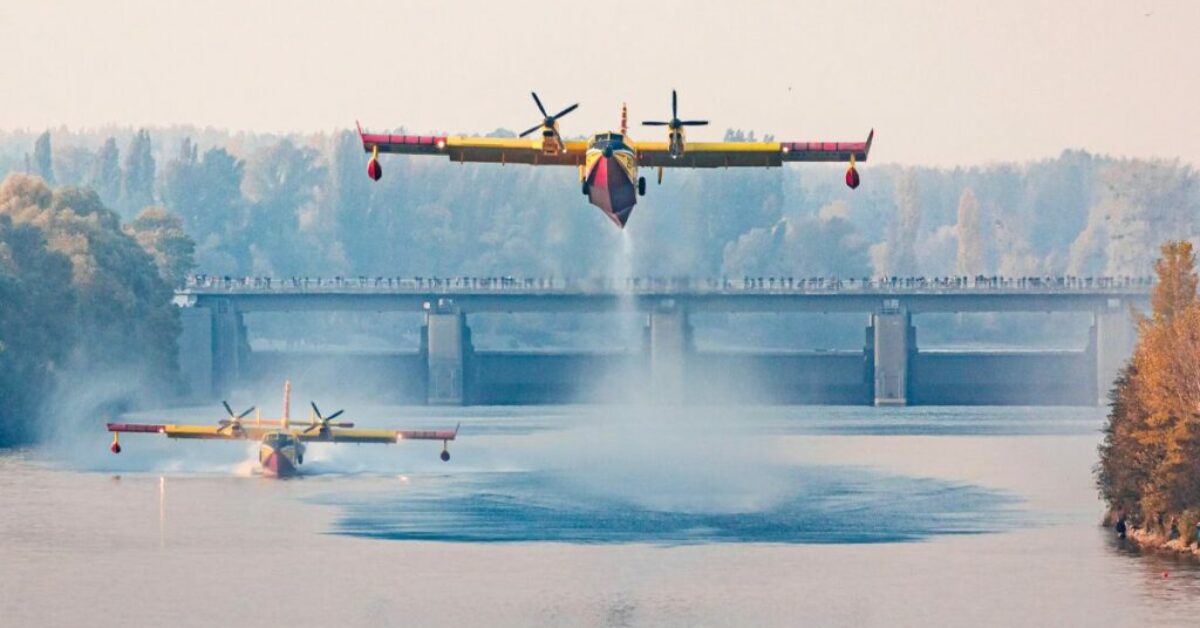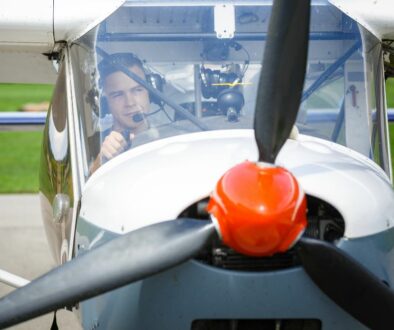How To Become A Firefighter Pilot?
Becoming a firefighter pilot is a dream career for many. The thought of being able to help others while flying is appealing to a lot of people. However, it is not an easy task to become a firefighter pilot, and requires a lot of hard work, dedication, and skill. Here is a step-by-step guide on how to become a firefighter pilot.
Steps To Becoming A Firefighter Pilot
Becoming a firefighter pilot is a challenging and rewarding career path that requires dedication, hard work, and a passion for helping others. Firefighter pilots play a critical role in fighting wildfires and protecting communities from the devastating effects of fires. Here are some additional steps to consider when pursuing a career as a firefighter pilot.
- Gain Knowledge and Skills in Firefighting
As mentioned earlier, gaining experience as a firefighter is a crucial step in becoming a firefighter pilot. During your time as a firefighter, you will learn how to operate firefighting equipment, perform search and rescue operations, and handle hazardous materials. You will also learn how to work as part of a team and develop leadership skills. Take advantage of every opportunity to learn and gain experience in all aspects of firefighting.
In addition to on-the-job training, you can also enroll in training courses and attend conferences to enhance your knowledge and skills. Many firefighting departments offer specialized training programs for their firefighters, including courses on aerial firefighting operations. - Obtain a Pilot’s License
To become a firefighter pilot, you must have a commercial pilot’s license with an instrument rating. This requires extensive training and flight hours. You can obtain your pilot’s license through a flight school or aviation academy. The training will include ground school, flight training, and flight simulator training.
It is also important to note that firefighting departments may have specific requirements for their pilots, such as a certain number of hours of flight time and experience working in aerial firefighting operations. Make sure you research and understand the requirements for the firefighting department you are interested in working for. - Gain Experience as a Pilot
After obtaining your pilot’s license, it is essential to gain experience as a pilot. This includes accumulating flight hours and gaining experience in different types of aircraft. You can gain experience by working as a flight instructor, charter pilot, or corporate pilot. You can also volunteer for firefighting operations and gain experience in aerial firefighting operations.
- Apply for the Position of Firefighter Pilot
Once you have met the experience and training requirements, you can apply for the position of a firefighter pilot. This involves going through a rigorous selection process, which may include written and physical tests, interviews, and background checks. Make sure you are prepared and meet all the requirements for the position.
Becoming a firefighter pilot is a challenging and rewarding career path that requires dedication, hard work, and a passion for helping others. By following these steps, you can increase your chances of becoming a successful firefighter pilot and making a difference in your community.
Skills Needed to Become a Firefighter Pilot
Becoming a firefighter pilot is a highly demanding and challenging career path that requires a unique set of skills and qualifications. In addition to the specific requirements set by departments, aspiring firefighter pilots must also have a range of skills and qualities that are essential for success in this field.
One of the most important skills that aspiring firefighter pilots must possess is excellent flying skills and experience in aerial firefighting operations. This involves the ability to fly a variety of aircraft, including helicopters and fixed-wing planes, and to operate them effectively in a firefighting context. Firefighter pilots must be able to navigate through challenging terrain, make quick decisions, and work closely with ground crews to battle fires from the air.
Another critical skill for firefighter pilots is good decision-making skills during emergencies. Firefighting is a high-stress job that requires quick thinking and the ability to make sound decisions under pressure. Firefighter pilots must be able to assess the situation quickly, evaluate the risks and benefits of different courses of action, and take decisive action to protect lives and property.
Excellent communication skills are also essential for firefighter pilots. They must be able to communicate effectively with other pilots, ground crews, and incident commanders to coordinate their efforts and ensure that everyone is working together towards a common goal. This requires clear and concise communication, as well as the ability to listen carefully and respond appropriately to feedback and instructions.
In addition to these skills, aspiring firefighter pilots must also have the ability to work in a team. Firefighting is a collaborative effort that requires close coordination between pilots, ground crews, and incident commanders. Firefighter pilots must be able to work effectively with others, share information, and support one another in the pursuit of their common goal.
Another important quality for firefighter pilots is the ability to remain calm under pressure. Firefighting is a high-stress job that can be emotionally and physically demanding. Firefighter pilots must be able to remain focused and composed in the face of danger, and to maintain their professionalism and composure at all times.
Finally, excellent physical fitness is also an essential requirement for firefighter pilots. This is a physically demanding job that requires strength, endurance, and agility. Firefighter pilots must be in excellent physical condition to perform their duties effectively and safely.
In addition to these skills and qualities, aspiring firefighter pilots must also have the necessary certifications, such as a commercial pilot’s license, instrument rating, and a valid medical certificate. These certifications demonstrate that they have the necessary training and qualifications to operate aircraft safely and effectively in a firefighting context.
Becoming a firefighter pilot requires a unique set of skills, qualities, and certifications. Aspiring firefighter pilots must possess excellent flying skills, good decision-making skills, excellent communication skills, the ability to work in a team, the ability to remain calm under pressure, and excellent physical fitness. With these skills and qualifications, they can pursue a rewarding and challenging career in aerial firefighting.
What is A Firefighter Pilot?
A firefighter pilot is a highly skilled professional who plays a crucial role in fighting wildfires. They are responsible for flying specialized firefighting aircraft, such as helicopters and airplanes, and working in conjunction with ground crews to contain and extinguish wildfires.
Firefighter pilots are often the first responders to wildfires and are responsible for assessing the situation and coordinating with ground crews to determine the best course of action. They must be able to fly in challenging conditions, such as low visibility and high winds, and be able to make split-second decisions that can mean the difference between life and death.
In addition to fighting wildfires, firefighter pilots also play a critical role in rescue operations. They are often called upon to transport injured or stranded individuals from remote locations to medical facilities. This requires not only excellent flying skills but also the ability to remain calm and focused in high-pressure situations.
To become a firefighter pilot, one must have extensive training and experience as both a pilot and a firefighter. Many firefighter pilots begin their careers as firefighters on the ground before transitioning to the air. They must also undergo specialized training in firefighting techniques and aircraft operation.
Despite the challenges, being a firefighter pilot can be an incredibly rewarding career. Firefighter pilots play a vital role in protecting communities and natural resources from the devastating effects of wildfires. They also have the opportunity to work in some of the most beautiful and remote locations in the world, providing a unique and exciting work environment.
The Benefits of Working as A Firefighter Pilot
Working as a firefighter pilot can be an incredibly rewarding and fulfilling career. You get to make a significant difference in the lives of people affected by wildfires and other natural disasters. You also get to work in an exciting and dynamic environment, flying aircraft and working in a team. Besides these, firefighting departments also offer good pay and benefits to their pilots, making it a great career choice for those who love aviation and firefighting.
One of the most significant benefits of being a firefighter pilot is the opportunity to help others. When wildfires and other natural disasters strike, firefighters and their pilots are the first responders on the scene. As a firefighter pilot, you will be responsible for flying aircraft to drop fire retardants and water on fires, helping to contain and extinguish them. You will also be responsible for transporting firefighters and equipment to and from the scene of the disaster.
Another benefit of being a firefighter pilot is the chance to work in an exciting and dynamic environment. Flying a firefighting aircraft requires skill, precision, and quick thinking. You will need to be able to make split-second decisions and react quickly to changing conditions. You will also need to work closely with other pilots and firefighting crews to ensure that everyone is working together effectively.
Firefighting departments also offer good pay and benefits to their pilots. According to the Bureau of Labor Statistics, the median annual wage for aircraft pilots and flight engineers was $147,220 in May 2020. Additionally, many firefighting departments offer health insurance, retirement plans, and other benefits to their pilots.
However, becoming a firefighter pilot requires a lot of dedication, hard work, and skill. To become one, you need to have a high school diploma, become a firefighter, gain experience, meet specific requirements, and possess excellent flying and firefighting skills. You will also need to pass a rigorous training program and obtain the necessary certifications and licenses.
Working as a firefighter pilot can be a rewarding and fulfilling career. You will have the opportunity to help others, work in an exciting and dynamic environment, and enjoy good pay and benefits. If you have what it takes, consider pursuing a career as a firefighter pilot.




